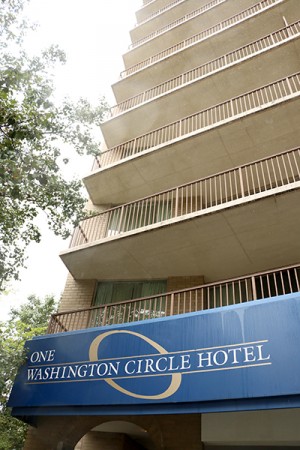The University wants a $4.5 million refund.
GW claims the District is trying to squeeze money out of the University, one of the largest landowners in the city, which pays less in taxes as a nonprofit. It filed a lawsuit last week asking the D.C. government to reduce its property taxes, the third time it has petitioned for a decrease in four years.
The lawsuit, filed Sept. 23, claims GW is paying too much money in taxes for the property it owns at One Washington Circle, 2000 Pennsylvania Ave. and 805 21st St.
The University pays property taxes on developments that it owns but uses to earn revenue through tenants’ rent. GW can bring in large rent payments because it owns several properties on Pennsylvania Avenue, one of the most coveted addresses in the District. It does not pay taxes on the buildings used for academics.
GW collected about $77 million last year in rent from its commercial properties across Foggy Bottom, including The Avenue and The Shops at 2000 Penn. That money helps boost its bottom line and pour money back into GW’s operating budget.
GW called the taxes “discriminatory” and a “denial of equal protection of the law,” according to court documents.
David Brunori, a research professor of public policy at GW Law School, said the University continues to file these claims because officials are confident they can win.
“It’s worth it for $4 million to hire some sharp lawyers, and the University usually hires some sharp lawyers, to challenge and either settle for something in between or hope you’re going to win it in court and save the money,” he said.
He said when cities need money, they look to organizations with large amounts of real estate. But when a nonprofit holds large amounts of real estate, Brunori said that draws even more scrutiny.
“Cities look much more closely at a university’s properties that are on the tax rolls,” he said. “They want to make sure they’re getting every penny out of it that they can because they’re not getting any other money from them.”
GW is asking for almost $4 million back for its properties at 2000 Pennsylvania Ave. and 805 21st St., and more than $500,000 for the One Washington Circle property, according to the documents.
The city assessed the properties last winter, and bumped down the value of the property at One Washington Circle, originally worth about $30 million, by about $2.3 million. The city did not change its estimated value on the other two properties, the University claims, and GW is now suing again for another appraisal.
The city found that the property at 2000 Pennsylvania Ave. lost $18 million in value over the past year, according to the documents.
GW argued last year that reassessing the properties in question, which included the same properties in this year’s case as well as office space at 2100 Pennsylvania Ave., would give back the University about $7 million. The city raised the property value of The Shops at 2000 Penn by 31 percent that year, according to those documents.
University spokesperson Kurtis Hiatt said in an email that the appeals process is a “vehicle for property owners to participate in the process of establishing a fair market value for property tax assessments.”
David Versel, a senior research associate at George Mason University’s Center for Regional Analysis, said city and county governments frequently assess properties’ values, so an appeal isn’t uncommon.
“In the case of a university, you’re not developing property to have maximum value,” he said. “GW is a nonprofit and their mission is not to make money, their mission is to do research and educate.”
Unlike most other universities nationwide, GW puts almost half of its investments in real estate. Competitor schools at most hold 15 percent of their endowments in real estate, according to analysis.
GW’s commercial real estate investments are worth about $813 million, according to GW’s 2013 financial report. Its 2014 financial report comes out later this fall.
Ken Redd, a director of research and policy analysis at the National Association of College and University Business Officers, said colleges nationwide have on average 8.5 percent of their investments held in real estate.
Harvard University started the trend of diversifying college investments to include more real estate in 1974. After the most recent recession, other schools followed, purchasing commercial buildings at low rates to fund other academic projects.
The D.C. Attorney General’s office declined to comment, citing a policy not to comment on pending litigation.







